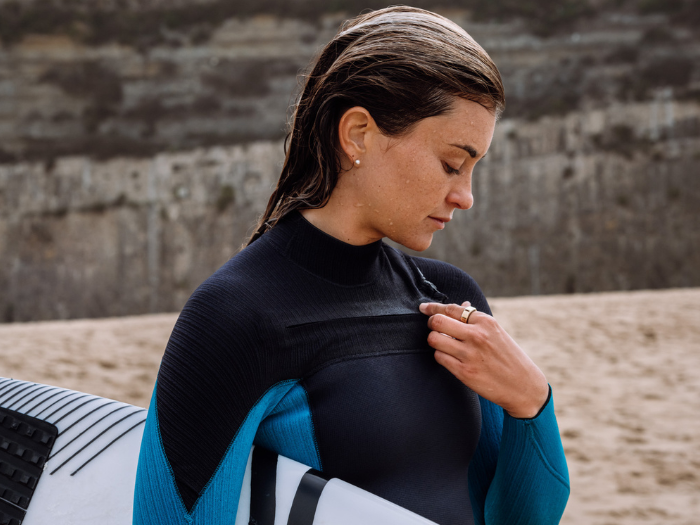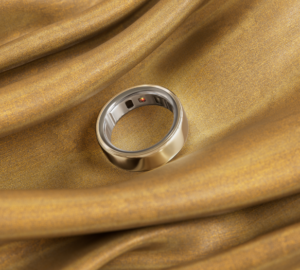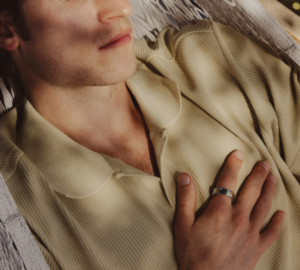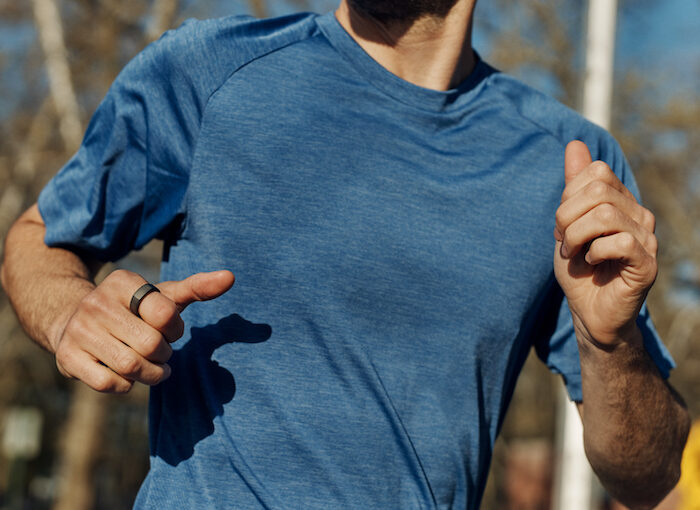In the past few years, the consumer health wearables category has taken tremendous strides forward. While Oura has led the way, starting with sleep, a new category of wearables has recently emerged: continuous glucose monitoring devices.
A continuous glucose monitor (CGM) is a wearable device that, as the name implies, continuously tracks interstitial glucose levels throughout the day and night. It painlessly attaches to the skin on the back of your upper arm.
Your glucose levels give you a personalized look at how your body responds to different foods — not only which foods allow you to feel your best now, but also those that will help protect you against a host of chronic diseases in the future. Plus, monitoring your glucose levels in real-time with a CGM device can also give you deeper insights into how your sleep, recovery, and athletic performance impact one another.
RELATED: How to Train Better Using HRV
Oura and Continuous Glucose Monitors
At Oura, our overarching mission is to improve the way we live our lives. We believe the CGM space aligns well with that mission, and we’re excited to announce the addition of three CGM companies to our growing list of integration partners: January, Supersapiens, and Veri.
Users of these CGM devices will be able to pull in Oura data, so they can see how their scores and biometrics impact their glucose levels, training, and daily life.
- January’s platform leverages data-driven insights from a CGM and artificial intelligence to align your health habits in the way your body needs. Learn more.
- Supersapiens (currently available in Europe only) is a real-time glucose monitor optimizing nutrition, performance, and recovery through glucose stability. Learn more.
- Veri’s membership includes a CGM-enabled app with personalized food and lifestyle guidance, engaging content, and a community, to help you achieve your health goals. Learn more.
“Ultimately, anyone interested in optimizing their overall well-being can benefit from integrating Oura with a CGM,” says Shyamal Patel, PhD, Head of Science at Oura.
By integrating this additional biometric information with the in-depth data found in Oura’s Sleep, Readiness, and Activity Scores, members can learn more about how their bodies react to various inputs and actions — from how they eat to how they move.
“These integrations enable you to gain insights into your sleep quality, activity levels, stress levels, recovery patterns, and glucose regulation,” Patel notes. “By identifying connections and patterns between these factors, you can make lifestyle adjustments to enhance your metabolic health, energy levels, and overall quality of life.”
What’s the Link Between Glucose and Sleep?
The relationship between glucose metabolism and sleep quality is bidirectional, Patel notes. In other words, your glucose levels impact your sleep quality — and vice versa.
How Glucose Levels Affect Sleep
“Both high or low blood glucose levels can cause sleep disturbances,” Patel says. Hypoglycemia (low blood glucose levels) can cause restlessness, night sweats, and frequent awakenings. On the other hand, hyperglycemia (high blood glucose levels) can cause frequent trips to the bathroom because of increased urination as the body tries to remove excess glucose via urine.
According to Dr. David Lipman, MBBS, director of applied science and content at Supersapiens, “People with poorly controlled glucose levels display shorter sleep duration and worse sleep quality, demonstrated by both self-report and objective measures.”
How Sleep Affects Glucose Levels
“Even one night of partial sleep deprivation seems to decrease glucose tolerance and insulin sensitivity significantly,” Lipman explains. “This is true of total sleep duration, but looks like it may be specifically and more sensitively related to slow wave sleep [also known as deep sleep], a phase of sleep traditionally associated with more physically restorative processes.”
Evidence also suggests that there may be a connection between less-than-ideal sleep quality — especially when deep sleep is impacted — and impaired glucose metabolism, Lipman says. In the long run, this can impact your body’s ability to cope with carbohydrate loads.
Further research also suggests that poor sleep can affect your overall metabolic health; one study showed that consistent poor sleep can even double or triple the risk of developing type 2 diabetes.
RELATED: How Sleep Helps With Weight Management

Can People Without Diabetes Benefit From CGMs?
In the past, CGMs have been used primarily by people with diabetes to monitor their glucose levels. However, these devices are becoming increasingly popular with a wider audience, especially among people looking to improve their athletic performance, weight management, and energy levels.
“Integrating Oura with a CGM can provide valuable insights for people with a wide range of needs,” Patel says. “It can enable individuals with metabolic health conditions to manage their condition more effectively by making more informed decisions about their diet and exercise based on how sleep, activity, and other lifestyle factors impact their glucose regulation.”
“For members focused on improving their athletic performance, they can leverage these insights to optimize their training and recovery strategies,” Patel says. “And members who are looking to lose or maintain weight can make more informed decisions as they manage their weight.”
However, Patel does note: “Unlike people who have diabetes, the benefits of continuous, long term tracking with CGMs for healthy people are limited. This space is evolving rapidly so the way we use this technology and insights is likely to evolve as we learn more.”
LEARN MORE FROM VERI: Why Glucose Matters Even If You Don’t Have Diabetes
Improve Your Sleep with Oura
Whether or not you integrate Oura with a CGM, the Oura App can provide personalized daily insights that can help you determine how your activities and habits impact your sleep and overall readiness. It’s always a good idea to follow the best practices for sleep hygiene, including keeping your bedroom cool and dark and avoiding alcohol and caffeine.
If you decide to integrate Oura with a CGM, you’ll gain access to even more biometric data and personalized insights that can help you achieve your health goals — whether you’re aiming to improve athletic performance, sleep better, manage your weight, or just have more energy overall.
RELATED: Introducing Oura Circles: Connect with Your Community and Reach Your Goals Together
About the Oura Expert
Shyamal Patel, PhD, is the Head of Science at Oura, where he leads an interdisciplinary organization focused on research and development of algorithms that translate sensor data into accurate measures of health and wellbeing. He is passionate about building digital health solutions that enable the transformation of healthcare from a largely subjective, episodic, and reactive model to become more objective, continuous, and proactive. Before Oura, Shyamal has led data science teams in several startups as well as large companies. Most recently he was at Pfizer where his work was focused on development, validation, and deployment of new digital endpoints across multiple therapeutic areas in regulated clinical trials. Shyamal has a PhD in electrical engineering with a specialization in signal processing and applied machine learning from Northeastern University. He completed his post-doctoral research at Harvard University and lives in Boston.




